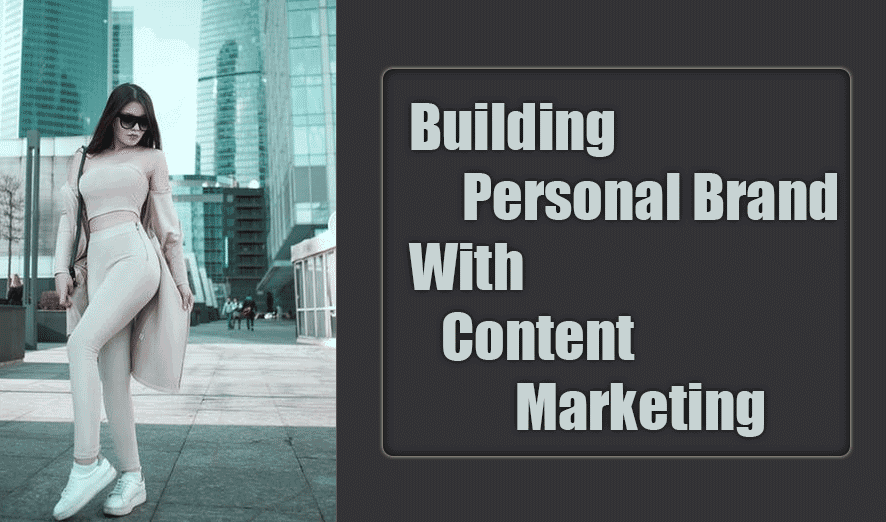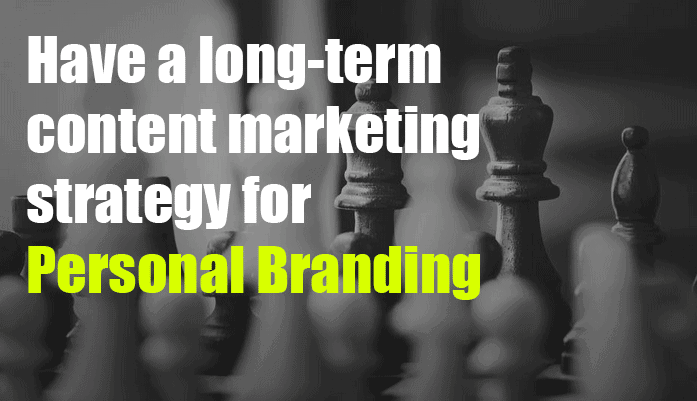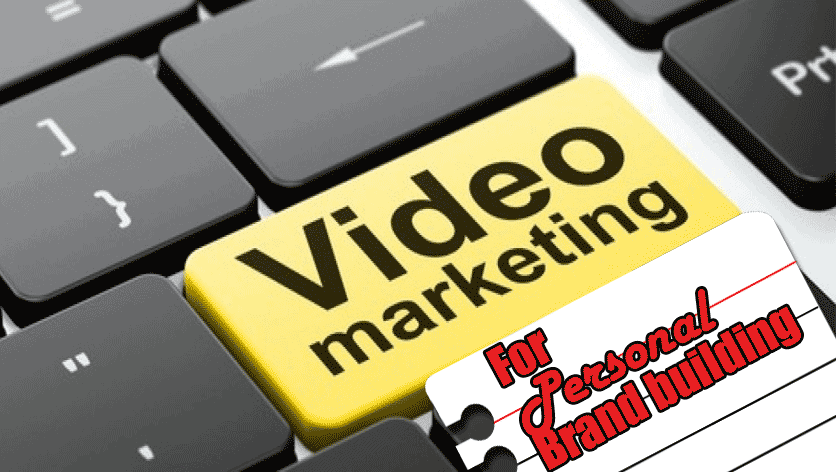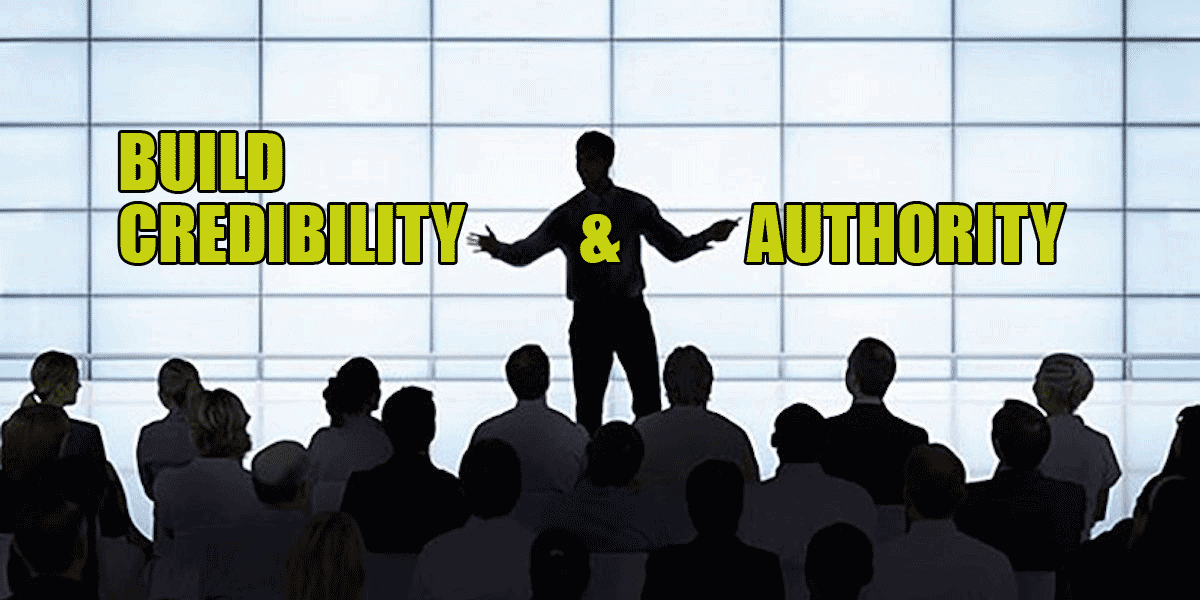
Personal branding with content marketing
What’s a personal brand?
A personal brand means a unique, identifiable professional identity that helps people recognize you immediately when they come across your name, business name or business logo.
A personal brand is, when people decide to work with you (or not) based on their perception of you.
Suppose you are a well-known motivational speaker recognized for high-caliber corporate leadership training workshops.
People know you.
Some people have attended your workshops and benefited immensely.
Some people have come across your books and articles.
Your name as well as your face is quite familiar to them.
The moment they come across your name or your face, the thoughts of leadership and authority crosses their minds.
They want to listen to you.
They want to be associated with you.
They wish you would endorse them.
There is a sense of pride in being associated with you.
They want to attend one of your workshops even if it means spending more than they can afford and travelling a great distance.
They want to hire you as a business consultant or their marketing consultant.
That’s your branding.
Why it is important to build your personal brand?

Importance of branding yourself
A personal brand opens many doors to opportunities simply because people are familiar with your name, they trust you, they respect your knowledge, they admire you for the stands you take.
You can be an author. You can be a journalist. You can be a business consultant. You can be a public speaker or a motivational speaker. You can be a politician.
Wherever, whenever people want to deal with you because of “you”, it is your personal brand that is working for you.
Many times you must have noticed, especially through blogging and social networking, many authors first create a presence on the Internet, build a brand for themselves as influencers, and then start publishing books, going on speaking assignments and getting published in reputed publications.
There are some great examples of personal brands on the Internet, namely Guy Kawasaki, Tim Ferriss, Gary Vaynerchuk, Avinash Kaushik and Seth Godin.
Branding doesn’t just help in business. It also helps to advance your career.
It helps you get a better deal when you get a job.
It enables you to charge more for your services instead of constantly having to negotiate and haggle.
As a celebrity, if your branding is good, it can get you lucrative sponsorships and endorsement campaigns.
If you want to publish a book, publishers will be more eager to have a look at what you have written, compared to a totally unknown person.
People take what you say, seriously.
You can do lots of good work if you have built your brand in any manner.
It opens multiple doors for you. Even in unrelated fields.
Building your personal brand with content marketing

Building personal brand with content marketing
Prior to the advent of the Internet it was very difficult to build a personal brand unless you had powerful connections or unless you had striven for years.
It either needed to be a full-time job or a fluke of luck.
Building a personal brand in the times of the Internet is easier compared to the olden days, although I’m not saying it’s easy.
Every worthy cause takes effort, hard work, persistence and creativity and building a personal brand is no different.
All those people I have mentioned above have spent years creating high-quality content – text, video, images – to constantly remain visible and instigate conversations among their peers.
They are always in the reckoning.
People are constantly talking about what they talk about.
Everything on the Internet is content.
This blog post that you are reading is content.
The Facebook, LinkedIn or Twitter update that you just checked is content.
The interesting YouTube video that you watched is content.
News websites like New York Times, Washington Post, Drudge Report – whatever they publish, is content.
The email that you read is content.
Basically, whatever is digitally being produced and then being used to convey something, or to show something, or to prove something, or to annoy or to please you or to make you cry with cuteness… whatever, is content.
When you use this content strategically, to achieve something like make people pay attention to what you’re saying, what you are selling, what you are promoting, what agenda you are running, it’s content marketing.
Simple definition: when you use content for marketing, it is content marketing.
With content marketing, you strategically produce, publish and distribute content to:
- Keep your audience engaged.
- Keep your audience informed (or misinformed, as in the case of politicians and journalists)
- Educate your audience
- Entertain your audience
- Help them solve problems
Eventually, be a part of their lives in such a manner that whenever you reach out to them through your content, they welcome your presence.
In fact, they’re looking forward to hearing from you.
What’s the benefit?
It’s easier to do business with a person you respect, recognize and trust.
You trust that person’s judgement.
You look forward to learning from that person and enriching your life directly or indirectly.
You endorse that person by sharing his or her thoughts and insights with friends, family members and colleagues (or with random Twitter followers who don’t care about what you are sharing with them).
To sum it up
- People know what you do.
- People respect you for your wisdom, wit, insight and knowledge.
- People know that you can be trusted.
- When they need something that you provide, they get it from you.
As I mentioned above, you can be anyone.
You can be a politician.
You can be an author.
You can be a celebrity.
You can be a corporate trainer, an IT consultant, a motivational speaker, a financial adviser or a business consultant.
In any field, where it can make a difference how people think of you, building your personal brand with content marketing can help you.
5 ways you can build your personal brand with content marketing
1. Have a clearly-laid out content marketing plan before you begin building your personal brand

Have a long-term content marketing strategy for personal branding
Why planning is important?
It always helps if you know what you’re doing, what you’re getting into, and what it entails.
For content marketing to be effective, to really be able to contribute to building your personal brand, it will need to be persistent.
It cannot be something like “Okay, I will try a few blog posts and see what happens”.
It is just like life, if you treat content marketing casually, it is not going to give you serious results.
Have a plan for at least a year.
Of course, to have a year-long plan you need to really believe that it is going to work for you.
How do you believe something?
Do research. Read case studies. Watch videos.
Unless you truly believe that you need to use content marketing to build your personal brand, it will be very difficult for you to succeed.
You will easily give up.
Anyway, assuming you’re pretty sure content marketing is the way to go, have a plan for at least a year.
Having a plan means
- Deciding where mostly you’re going to publish and market your content – your own blog or social networks and social apps.
- Knowing what sort of content from you will be appreciated by your audience – food pics, cute baby and animal photos, pics of your butt (if you are one of the Kardashians), authoritative blog posts in your field, conversations with industry experts, latest news updates from your area of expertise, advise, views and reviews and so on.
- What is going to be the frequency of content publishing – you may decide to publish every day, whenever you feel like, or on fixed days, something like every Wednesday. Depends on how eager your audience is to lap up your content and how much time it takes for you to create quality content.
- What is your budget – your budget is going to have a big impact on your overall content marketing. Remember that your personal branding solely depends on the quality of your content. Save your money anywhere else, but when it comes to getting quality content, don’t try to save a few bucks here and a few bucks there.
Recommended reading: How your typical content marketing evolves
2. Build a mailing list

Building your own mailing list for personal branding
When you set up a website or a blog, having a lead capturing form should be one of the topmost priorities. Despite social media apps and websites, people still check their emails every day and they prefer to receive updates in their inboxes, provided you don’t spam them.
Keeping track of one’s timeline on Facebook and Twitter or even LinkedIn, can be a challenge. If you follow lots of people and if these people are very active, you may miss many important updates.
The same may happen with your audience.
But they are sure to check their emails.
You can use your mailing list to let your subscribers know whenever you publish new content or whenever you do something that needs to be shared.
I mostly send an update when I publish a new blog post on my Credible Content blog.
I have another mailing list that I use to distribute my journalistic opinions and since most of the people who have subscribed to that mailing list are strongly opinionated, my open rate is normally 35% and click through rate is 25%.
Recommended reading: Email marketing with the strength of your content
3. Don’t ignore search engine rankings

Content marketing to boost your SEO
Search engine rankings are very important for your personal branding, especially in the field of business.
People are constantly looking for information on search engines.
If you provide the information they’re looking for, they should be able to find your content on search engines.
99% of your audience won’t be specifically looking for your name. They will be looking for the topics you write on, or create visuals on.
The best way of drawing people to your website or blog is by making your content visible on social networking websites like Facebook, Twitter, LinkedIn and Instagram, and by improving your search engine rankings.
The click through rate on social networking websites is mediocre because when people are browsing through their timelines, they are reluctant to leave their timelines. They would rather miss an important update than move away from Facebook or Twitter.
Also, timelines move very fast. If they are not staring at their timelines all the time, there is a big chance that there are going to miss your update.
On search engines on the other hand, since people are already looking for links to go to, they don’t think twice before clicking the link.
Once your links begin to appear in search results, they are going to remain there for a long time.
How do you improve your search engine rankings?
By publishing very focused content.
Content that solves specific problems and handles specific topics.
Writing for search engines, while maintaining quality, takes practice and experience.
No matter what the “experts” say, keywords and search terms matter.
But you need to use them in such a manner that search engine algorithms don’t conclude that you are trying to trick your way into top rankings. If this happens, instead of improving your rankings, they reduce them.
Strategically use your keywords and search terms in the topics of your blog posts, videos and images.
Recommended reading: 5 reasons why content writing is important for SEO
4. Whatever content format you prefer personally, don’t ignore YouTube or IGTV

Video marketing for personal brand building
There are many reasons people prefer videos to other content formats.
A video is easier to watch. It is a full audiovisual experience.
It’s also faster: something that may take 1000-1500 words if you write a blog post, can be communicated in a couple of minutes in a video.
Besides, people trust you more if they can see you live, moving, talking, making expressions, pointing at things, twisting your lips, rolling your eyes or rubbing your chin, and saying cool stuff.
YouTube is of course one of the most known video streaming platforms.
Now you also have IGTV on Instagram.
You will need to see where your videos perform well.
Making a video is not very difficult these days.
You can make a video with every mobile camera.
You can even create a slide and then turn it into a video if you don’t prefer to create live videos.
Any animated bit of information that can be uploaded on a video platform will do, provided it is interesting, crisp, fast-moving and above all, useful.
Recommended reading: Should you switch to video content or stick with written content?
5. Publish valuable content to build credibility and authority

Build credibility and authority with content marketing
The visual quality of your content is icing on the cake. Even the regularity doesn’t matter much these days as Google increasingly focuses on credibility and authority.
This is where you should focus the most when you are trying to build your personal brand with content marketing.
There is no use creating a very sleek video that people should be able to enjoy in 4K HD if after watching the video they don’t gain anything except for feeling impressed.
The same goes for your blog posts. There is no use writing a 2000-word blog post if it is just a meaningless monologue written solely to improve your search engine rankings.
Always deliver value.
Doesn’t matter if you are not Salman Rushdie.
Doesn’t matter if you’re not Steven Spielberg.
As long as you deliver value. As long as people can use your content to enrich their lives, to improve their work lives and personal lives, you’re good to go.
Through regularly sharing useful information – information that can be used in some manner to solve problems and make life easier – you build your credibility and authority.
This makes it easier for people to listen to you carefully and believe in what you are saying.
They are more inclined to share your content and recommend it, or react to it.
The influencers in your field feel good about being associated with you.
Recommended reading: Relevance of relevant content
Conclusion
When you have a personal brand image it opens many doors for you and creates unique opportunities that are otherwise not available to lesser-known people.
Through content marketing you don’t need to force yourself up on people.
Content consumption is very natural these days. Publish something valuable, and people automatically consume it.
You just have to figure out what your target audience appreciates and then start producing it and publishing it.
Make sure that you are not known for the nuisance value of your content. Be known for your content’s authority, credibility and trustworthiness.
Constantly, persistently publishing high-quality, relevant, valuable and authoritative content is the best content marketing strategy for building your personal brand.








